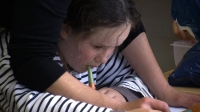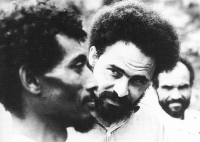Jordane Maurs
Jordane Maurs (born 1979) studied literature and ethnology at the Université Paris 7 Denis Diderot. In the context of her doctoral thesis on Tuareg poetry she spent one year in Mali and realised the film N’tamat (2007). This experience also provided her with insights into the role of the francophonie in African countries, which later fed into her documentary essay, The ignorant schoolmaster – commentaries (2011). Besides being a filmmaker, Jordane Maurs works as a dramaturgist and conducts workshops; she is a member of the collective organizing film festival “globale” in Berlin.
Wednesday, June 13, 2012
19.00
Le maître ignorant – commentaires (Der unwissende Lehrmeister – Kommentare) Jordane Maurs, HD Video, D 2011, 71’, French w/ German subtitles
21.15
Mirt sost shi amit (Ernte 3000 Jahre) Haile Gerima, 16mm, Ethiopia 1975, 138’, Amharic w/ German subtitles
The ignorant schoolmaster - commentaries is a parable on authority, teaching and language, inspired by the book of the same name by contemporary philosopher Jacques Rancière. Regularly switching visual and narrative registers, Jordane Maurs combines observations at a bilinugal elementary school in Berlin with conversations she had with French speaking Africans about body, language, and authority. Through association and gestures the educational and the colonial narrative develop cross-references: teaching, instruction, indoctrination, subordination become inseperable when it comes to learning a language.
Francophonie
Jordane Maurs’ interviewees are originally from Congo-Brazzaville, Benin and Senegal. They talk about the formative experience of growing up in a francophone school system that serves to suppress existing local languages. Teaching a language becomes visible as a tool for colonizing both body and mind. It also effects non-verbal aspects of child development and tends to stigmatize individual African identities.
The school system
These conversations dealing with the colonial context are intercut with observations from the French class at a bilingual school in Berlin. Even if the class situation appears to be exemplary - a small class, a patient and understanding teacher - the deep effects of the authoritarian relation between teacher and pupil inevitably come to to the surface. The pupils learn that authority is not to be questioned, and that success is linked to an individual arrangement with it. The games which the children play in their breaks, and especially a role play between a girl and boy tell of those things which are learned on the more subtle levels of the curriculum.
Meta discourse
The film takes its title from Jacques Rancière's book, "The ignorant schoolmaster". Regular citations relate the images and conversations to a wider understanding of the "school system": the ideal of "life-long learning" dominating contemporary concepts of labor as well as individual biographies; the ideology of learning as accumulation of knowledge. On the one hand, the presence of Rancière's text serves to structure the film's narrative, on the other however, the quotes tend to reflect back on the film's very own relation to the auhtority of a meta-discourse. The texts critical stance on authority therefore deliberately challenges the film and its relation to the viewer. In his more recent book, "The emancipated spectator", Rancière himself has developped his argument further in this direction.
Carte Blanche: Mirt sost shi amit (Harvest 3000 Years)
As a "Carte Blanche" Jordane Maurs has selected Haile Gerima's Mirt sost shi amit from the Arsenal's film archive. The film was shot with an Ethiopian-American crew during the uprising against the regime of Haile Selassie. It was part of a tremendous self-empowerment of African filmmakers and ranks as a classic of the "Third Cinema". Gerima combines his radical social critique, owing much to Frantz Fanon, with an ingenious and idiosyncratic visual language. Like few others, he succeeds to make tangible the tensions in his contemporary society which were finally about to become unbearable.





